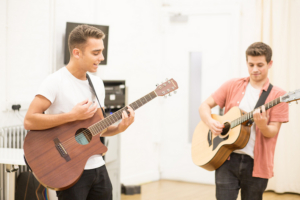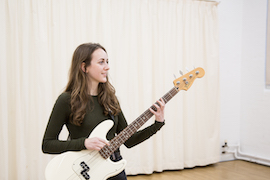Guest Blog: Writer/Director Jack Sain On Musical THE GREEN FAIRY

The first song we (Stephen Libby and I) wrote for the show was "Dark Paradise" - and it was one of the quickest. We knew what we wanted to say. We started it in a park, then ran home to get to the piano. The last was "Happy Hour".
The first was easy, perhaps an evening - the last took us months. We wrote four different versions, none of which fit. I think every hour spent thinking about "Happy Hour" was by the piano - in retrospect, fresh air and pacing is a game-changer. Highly recommended.
What distinguishes the two numbers is that "Dark Paradise" works as a standalone ballad duet about being consumed by someone who can never return your love - fairly universal stuff. "Happy Hour", however, is a narrative piece where we track the progress of three lives over four years. What's vital is how you convey time passing and moods shifting. In this case, exhilarated to exhausted. Young Jo, Daniel and Toby leave school and start working in a pub. At first they enjoy it, but as years go by, through marriage and childbirth, the strains start to show.
Our list of purposes: to convey the characters initially carefree; to see the drinking taking over; to establish the shifting relationship between them; and fundamentally, succinctly showing the events the audience need to know about. A title: it was called "Monday" for a while. It was called "I Suppose" for a hot minute. Both sketches were dire. It's a necessary act of structure, not self-expression: the song doesn't come directly from our lives, so the images came slower. Eventually, we thought of the happy hour - how satisfying it is for people coming in from work, but how much work it is from behind the bar.

The words then came fairly quickly - but what did it sound like? The key chord progression of the chorus had to be a balance of playful and wistful to fit with the various stages of their life. At first, I played with repeating that structure over and over so that the monotony of the characters' ritual seeped into the song. And then I realised that was catastrophically boring. I tried slowing down the tempo to have the same effect. Dull dull dull.
I then tried using bits of those devices but with a lot of variation in the orchestration - at one moment, the actor-musicians play it rousingly to one another, then at another it passes to a mournful solo violin. And then it became technical - if that person is playing a violin then, they can't be throwing a bottle, which means that that sad bit needs to be covered by the second guitar, but that motif isn't tied to that character. Do we need it? Oh, they could probably manage it if the violin is passed to them by that other character - oh no wait, that character is onstage but they're in a different world at that point, and...
We grappled with questions like this, but it was fun. More mathematical than a ballad or torch song perhaps, but it's still satisfying to cram four years into seven minutes. What unlocked the song is realising how physical it would be - we knew the size of the space we'd be working in, so could vaguely fit their "routine" to the music. As I'm writing this, bottles are being raised into the roof of the theatre at our get-in, our bar is in place, and I've just paced back and forth between our pieces of furniture to make sure the tracks that we wrote months ago work now it's all finally in situ. Fingers crossed.
The Green Fairy is at the Union Theatre until 23 November
Photo credit:
Comments

Videos
